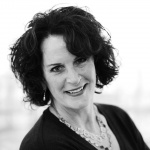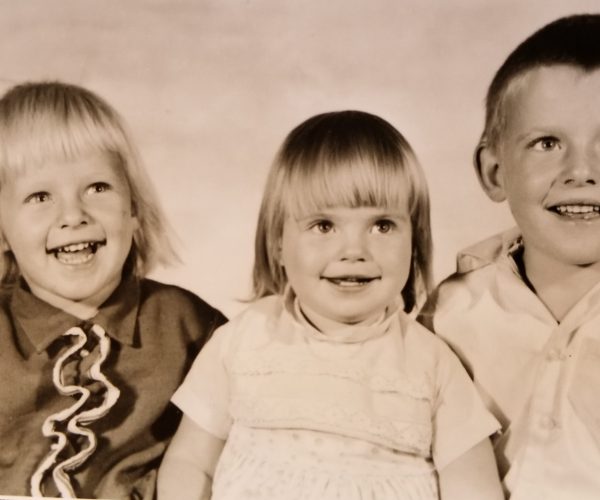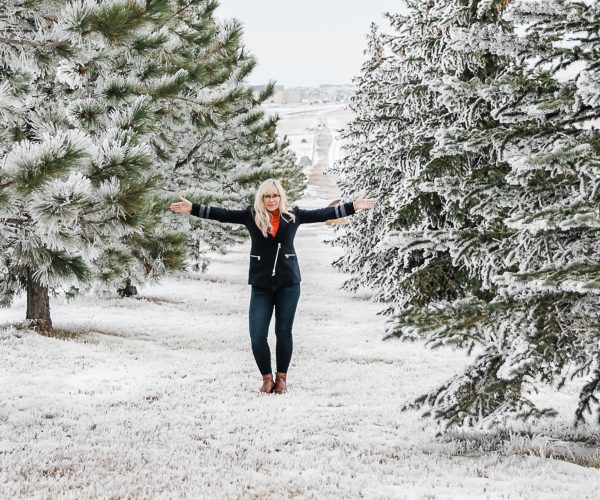by Paula Redmann
Photography: Photos by Jacy
If you met Ruth Knutson for coffee and sat across the table from her, you would see a calm, beautiful woman with soulful eyes. Within moments, after just a few sips, you would feel her sense of peace and grace, and would never know she came from — and came through — a very unsettling past, and that she is living proof of the power of forgiveness.
Ruth grew up in an alcoholic home with five siblings in a small North Dakota town. Her mother had four of her siblings with different fathers who were not present in their lives. When Ruth was 4 years old, her mother married an alcoholic who was extremely violent.
As children, they experienced physical, emotional, verbal, and sexual abuse.
Their home life was complete chaos. Heat got turned off, neither clothes nor children were washed, strangers arrived in the middle of the night for parties, and moving was common since rent didn’t get paid. During one period without heat in their home, Ruth and her siblings stayed with their grandmother. It was here that Ruth began to going to church every Sunday.
“I enjoyed the feeling I felt being at church. I could talk to Jesus, and I felt safe and loved,” she says.
There was no steady income or sense of order for Ruth and her siblings. They didn’t know a schedule, bedtime, nap time, meal time, or peace. Neglect was the norm. Any financial assistance received went to purchase alcohol; food stamps were abused. Ruth became the parent and caregiver for her siblings. As a second grader, she did the cooking and cleaning, and her mother called her “Cinderella.” Ruth worked hard to please her mother and stepfather, hoping her efforts would make them happy and the abuse would stop. It didn’t.
REFUGE
Another place of refuge, besides church, was school. Ruth could have a hot meal, be with friends, and be a child. She hoped for a Saturday sleepover with a friend because she knew it was bath night and she could not only have a bath, but there would be a meal. She could also wear her friend’s clean clothes and go to church with them on Sunday. She looked at the families in church and prayed that she could one day have such peace and such a family.
Refuge finally came in the form of law enforcement when in a drunken rage, Ruth’s stepfather threatened Ruth’s grandmother with a knife and the police were called. As a Canadian citizen, he was forced to leave the United States for five years. Ruth was 7 years old the last time she saw him.
FINDING A NORMAL LIFE
Ruth’s mother’s priority was not her children; it was alcohol. The family was certainly familiar to the social services system, and between first and fourth grades, Ruth lived in three different foster homes. One of the homes was that of her aunt and uncle in Williston, North Dakota. Ruth thrived.
“I loved the schedule, the boundaries, the rules, and the proper way of doing things. We learned table manners and respect and kindness. We went to church on Sundays. I could play outside like all the other kids and not have a care in the world. I was filled with gratitude and thanked Jesus that I could finally be a normal kid and have a normal life,” she explains.
Ruth’s mother went through treatment, and when Ruth was in the sixth grade, she and her siblings had an opportunity to move back home. Ruth told the social worker she never wanted to go back.
“I wanted out, I got out, and I never wanted to return,” Ruth says.
Her taste of a happy life with order and church and school had filled her, for the first time, with hope for the future. She stayed away from her mother, kept in touch with her siblings — who were in and out of foster care — as best as she could, and Ruth was happy.
“I’m forever grateful to the foster families that took me in. I learned a lot about life and have incorporated that into my own family,” Ruth says.
FORGIVING vs FIXING
During her senior year of high school, Ruth married Ron. They moved to Grand Forks where Ron started college and the two of them started a family. While Ron and Ruth raised their five children and made a life together in Bismarck, Ruth was ever the student.
“I read books on alcoholism and families and dysfunction. I wanted so much to try to understand where the road could have been different. I learned about shame and vulnerability and that if you can’t forgive, you’re already dying. I learned that it wasn’t my fault and that I couldn’t “fix” my mother. I absorbed everything I read, and when my youngest son started kindergarten, I went to school to realize my dream of a college education.”
Ruth graduated from the University of Mary with a social work degree. She became a licensed addiction counselor and learned again and again how addiction can ravage individuals and rob families.
INCREDIBLE PEACE
Ruth has experienced several “light bulb moments” in her life. A big one was when an aunt told her that her mother was dying of lung cancer and was only given months to live. This aunt knew Ruth wanted to reconnect with her mother one day in the hope of working toward forgiveness. Ruth volunteered to drive her mother to a doctor’s appointment. She envisioned the drive with her mother and the BIG apology; the one where her mother would ask Ruth to forgive her for all the terrible things that had happened to Ruth and her siblings. The apology never came. Ruth asked her mother about those years of her childhood, but her mother had no recollection of the horrors that Ruth and her siblings went through.
“She had no clue. Her alcoholism had robbed her of the ability to be present in my life. She didn’t know the traumatic affect her actions had on me and my siblings,” Ruth says. “And suddenly, I felt this incredible peace.”
It was then that Ruth realized her mother was never really her mother, but she had a very short period of time where she could be a daughter.
“From that moment on, I told her I loved her every time we talked, and after a while, she started saying it back. By this time, my mom had been in recovery for 10 years and had completed her college degree. I had so hoped that being sober would bring an apology, but it didn’t happen. I realized then that hurting people hurt [other people], and I had no idea of what her childhood was like, and I didn’t know her full story,” Ruth says.
Ruth’s mother died a few months later. Her stepfather attended the funeral, and Ruth told him she forgave him.
“I realized I was finally grieving for this little girl that wasn’t allowed a childhood. Ironically, this took place in the same church where I first accepted Jesus in my life.”
THE FORGIVENESS FACTOR
Looking at her own story of loss, fear, and pain, Ruth could be consumed by anger or resentment, but she is filled only with gratitude and grace.
“I’ve been so blessed to have this lesson that showed me the power of forgiveness. It’s important to know that no one plans on having addiction problems. I’ve worked with amazing, beautiful people who found themselves in the grips of addiction who, through treatment and recovery, have been able to get back to rediscovering themselves. Forgiveness is a major factor in recovery.”
Having compassion for the other person is a key component to forgiveness, Ruth says.
“I know that by showing my mother kindness and compassion, I was able to understand that forgiveness is part of my story and it is my privilege to share. I’m forever an optimist. I know that everything in life is beautifully weaved with lessons and learning. I have the power to resolve the things that have happened so that the hurting stops with me. I want to love freely and understand the power of forgiveness. The story is the easy part, and the story gets embellished along the way because we’ve told it repeatedly. It’s like a tape in our heads that we continue to play. Stop telling the story of helplessness and tell the story of recovery. The hardest thing to acknowledge is that we betrayed ourselves by holding on to the hurt.
“Being angry wastes so much time. We spend so much time on the past, on the transgression and hurt, that it prevents us from enjoying the present. It’s like the hurt takes up rental space in your brain. How long do you want that hurt to stay there, rent free? Well, the rent is up, and it’s time for the hurt to get out. Anger and resentment can become all consuming. I used to ask myself, ‘Couldn’t my mother see the terrible things happening in our home?’ No, she couldn’t.
It’s like we have life backwards. We don’t spend time thinking about all the good people in our lives and all the impact they’ve had. We dwell on anger and resentment and not all the beautiful pieces and people around us. I feel so blessed to have the life I’ve been given. I tell my husband and children and grandchildren how much I love them. There are lots of hugs and kisses. The peace I’ve given myself has allowed me to love generously and live freely. What a gift.”
Forgiveness is the bridge between hurting and healing
Tips from Ruth Knutson, based on “Forgive for Good,” by Dr. Fred Luskin
What Forgiveness Is
Forgiveness is the peace you learn to feel when you can let go of past hurts. Forgiveness is for you and not the offender. Forgiveness is taking back your power. Forgiveness is taking responsibility for how you feel. Forgiveness is about your healing and not about the people who hurt you. Forgiveness is a trainable skill. Forgiveness helps you get control over your feelings. Forgiveness is becoming a hero instead of a victim. Forgiveness is a choice. Everyone can learn to forgive.
What Forgiveness is Not
Forgiveness is not condoning an unkindness. Forgiveness is not forgetting that something painful happened. Forgiveness is not excusing poor behavior. Forgiveness is not denying or minimizing your hurt. Forgiveness does not mean reconciling with the offender. Forgiveness does not mean you give up having feelings.
Helpful Steps in the Process of Forgiveness
- Tell the story one last time to a trusted confidant.
- Recognize that the event may not have been a deliberate attempt to hurt you. It could have simply been circumstances.
- Give the grievance story a new ending — one where you choose peace and move on from carrying the grievance with you all the time.
- Find the door that lets you out of the room where you have kept yourself. That room is called hurt. The room may not have been started by you, but it’s maintained by you.
- Ask yourself, “How is holding on to this story serving me?”
 Paula Redmann is the community relations manager for Bismarck Parks and Recreation District. She married her high school sweetheart, Tom. They have two grown sons, Alex and Max.
Paula Redmann is the community relations manager for Bismarck Parks and Recreation District. She married her high school sweetheart, Tom. They have two grown sons, Alex and Max.


